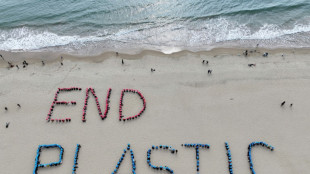
-
 Argentine ex-president Fernandez gives statement in corruption case
Argentine ex-president Fernandez gives statement in corruption case
-
Mexico says Trump tariffs would cost 400,000 US jobs

-
 Car-centric Saudi to open first part of Riyadh Metro
Car-centric Saudi to open first part of Riyadh Metro
-
Brussels, not Paris, will decide EU-Mercosur trade deal: Lula

-
 Faeces, vomit offer clues to how dinosaurs rose to rule Earth
Faeces, vomit offer clues to how dinosaurs rose to rule Earth
-
Ruby slippers from 'The Wizard of Oz' up for auction

-
 Spain factory explosion kills three, injures seven
Spain factory explosion kills three, injures seven
-
US Fed's favored inflation gauge ticks up in October

-
 Defence lawyers plead to judges in French mass rape trial
Defence lawyers plead to judges in French mass rape trial
-
US says China releases three 'wrongfully detained' Americans

-
 New clashes in Mozambique as two reported killed
New clashes in Mozambique as two reported killed
-
Romania officials to meet over 'cyber risks' to elections

-
 Chelsea visit next stop in Heidenheim's 'unthinkable' rise
Chelsea visit next stop in Heidenheim's 'unthinkable' rise
-
Former England prop Marler announces retirement from rugby

-
 Kumara gives Sri Lanka edge on rain-hit day against South Africa
Kumara gives Sri Lanka edge on rain-hit day against South Africa
-
Namibia votes with ruling party facing toughest race yet

-
 Spurs goalkeeper Vicario out for 'months' with broken ankle
Spurs goalkeeper Vicario out for 'months' with broken ankle
-
Moscow expels German journalists, Berlin denies closing Russia TV bureau

-
 Spain govt defends flood response and offers new aid
Spain govt defends flood response and offers new aid
-
France says Netanyahu has 'immunity' from ICC warrants

-
 Nigerian state visit signals shift in France's Africa strategy
Nigerian state visit signals shift in France's Africa strategy
-
Stock markets waver as traders weigh Trump tariffs, inflation

-
 Tens of thousands in Lebanon head home as Israel-Hezbollah truce takes hold
Tens of thousands in Lebanon head home as Israel-Hezbollah truce takes hold
-
Opposition candidates killed in Tanzania local election

-
 Amorim eyes victory in first Man Utd home game to kickstart new era
Amorim eyes victory in first Man Utd home game to kickstart new era
-
Fresh fury as Mozambique police mow down protester

-
 Defeat at Liverpool could end Man City title hopes, says Gundogan
Defeat at Liverpool could end Man City title hopes, says Gundogan
-
Indonesians vote in regional election seen as test for Prabowo

-
 Guardiola says no intent to 'make light' of self harm in post-match comments
Guardiola says no intent to 'make light' of self harm in post-match comments
-
New EU commission gets green light to launch defence, economy push

-
 Opposition figures killed as Tanzania holds local election
Opposition figures killed as Tanzania holds local election
-
Taiwan Olympic boxing champion quits event after gender questions

-
 European stocks drop on Trump trade war worries
European stocks drop on Trump trade war worries
-
Volkswagen to sell operations in China's Xinjiang

-
 FA probes referee David Coote over betting claim
FA probes referee David Coote over betting claim
-
Serbia gripped by TV series about murder of prime minister

-
 Putin seeks to shore up ties on visit to 'friendly' Kazakhstan
Putin seeks to shore up ties on visit to 'friendly' Kazakhstan
-
New EU commission pushes for defence and economy spending

-
 Plastic pollution talks must speed up, chair warns
Plastic pollution talks must speed up, chair warns
-
Pakistan web controls quash dissent and potential

-
 1,000 Pakistan protesters arrested in pro-Khan capital march
1,000 Pakistan protesters arrested in pro-Khan capital march
-
ICC prosecutor seeks arrest warrant for Myanmar junta chief

-
 Philippine VP's bodyguards swapped out amid investigation
Philippine VP's bodyguards swapped out amid investigation
-
EasyJet annual profit rises 40% on package holidays

-
 Ukraine sees influx of Western war tourists
Ukraine sees influx of Western war tourists
-
Greeks finally get Thessaloniki metro after two-decade wait

-
 New EU commission to get all clear with big push on defence and economy
New EU commission to get all clear with big push on defence and economy
-
Thousands of Lebanese head home as Israel-Hezbollah truce takes hold

-
 Australia takes step to ban under 16s from social media
Australia takes step to ban under 16s from social media
-
Volkswagen says to sell operations in China's Xinjiang


Violence at Spanish enclave sparks fear of worse to come
A massive attempt by migrants to storm the barrier between Morocco and the Spanish enclave of Melilla resulted in "unprecedented violence" that killed at least 23 sub-Saharan Africans and has sparked fears of worse to come.
"It was like a war, we were holding rocks, little rocks, to fight the Moroccan military, who beat us by any means, with sticks," said a 20-year-old Sudanese migrant at a detention centre inside Melilla.
"I climbed up the fence but a Moroccan guard hit my hands. I fell unconscious on the Spanish side, where I was beaten up by Spanish forces," said another.
They were among 2,000 migrants who on Friday stormed the heavily fortified border between the Moroccan region of Nador and the enclave of Melilla.
At least 23 migrants died and 140 police officers were wounded, according to Moroccan authorities -- the heaviest toll in years of such attempts.
Many of the migrants, often from war-torn zones such as Sudan's Darfur region, have spent months or even years under precarious, dangerous conditions in the nearby forest of Gourougou, braving beatings and arrests in multiple attempts to reach better lives in Spain.
But observers said the latest attempt was unprecedented in the level of violence.
"It's the first time that we see this level of violence by migrants themselves against security forces," said Omar Naji from the Nador office of the AMDH rights group.
The violence has heightened fears among Moroccans in the area.
"We're terrorised by what happened," said Issame Ouaaid, 24, from the border district of Barrio Chino.
"It's the first time that we've seen migrants carrying iron rods to fight with the police."
- Migrants treated 'very harshly' -
Naji linked the level of violence to a recent mending of ties between Spain and Morocco, leading to renewed cooperation against migrants and stricter enforcement.
Morocco, the only African country sharing a land border with the EU, is a key conduit for migrants fleeing war and poverty.
But the kingdom has also been accused -- by Spain -- of using migration flows as a tool to exert political pressure.
In May 2021, some 10,000 migrants surged across the border into Spain's other enclave, Ceuta, as Moroccan border guards looked the other way, in what was widely seen as a punitive gesture by Rabat in a political row over the disputed territory of Western Sahara.
The two countries' resumption of ties earlier this year after a convergence on Western Sahara has led to "an intensification of pressures" against migrants living rough in the forested hills near the border, Naji said.
Recent months have seen a fall in the numbers of migrants reaching Spanish territory, according to Madrid.
"The Moroccan authorities treat migrants very harshly, raiding their camps," Naji said.
"There's no doubt that this pressure has generated the unprecedented violence we're seeing."
- Ceuta bid foiled -
Before Friday's incident, Spanish media reported several clashes between migrants and security forces, who had chased away residents of camps and transferred some away from the border region.
For Othmane Ba, president of an association for sub-Saharan African migrants in Morocco, "the difficult conditions these migrants are facing condition them psychologically for violence".
A majority of migrants arriving in Morocco are originally from Sudan, particularly the Darfur region where a new spike in violence has left 125 people dead and 50,000 displaced.
On their way to Morocco, many pass through Libya, notorious for rights abuses by armed groups against migrants.
Once they arrive in Morocco, many are willing to risk their lives to reach Europe.
"There are people here who have been waiting for two or three years" to get across, Naji said.
Moroccan authorities said Sunday they had foiled a plot by migrants to cross the border into Ceuta, making 59 arrests.
But, Naji said, "Morocco can't totally close its borders and play the role of police force for Europe. That policy can only lead to more violence."
isb-fs-kao-agr/par/hc
F.Pavlenko--BTB

